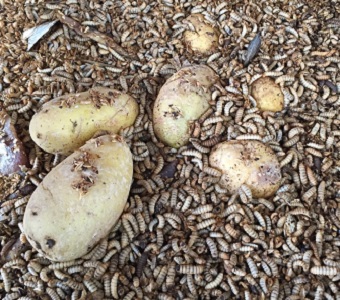Why cows should eat insects
NZZ article focuses on Swiss firm and research from ETH Zurich and Eawag advancing the use of black solder fly larvae for feed. The research of WFSC members Prof. Alexander Mathys and Dr. Christian Zurbrügg is featured.

Insects, such as the black soldier fly, are considered as one solution to provide sustainably produced protein needed for a growing world population. A recent article in Neue Zürcher Zeitung am Sonntag (23 June 2018) details how the Swiss company Bühler Insect Technology Solutions is looking to grow the insect as feed market.
The article then highlights the research project “Insect production from biowastes for animal feeds,” a collaboration of the Sustainable Food Processing group of Prof. Alexander Mathys at ETH Zurich, the Department of Sanitation, Water and Solid Waste for Development (Sandec) at Eawag, industrial partners, and local processing facilities in developing countries. The doctoral student Moritz Gold leads the project that aims to increase the performance of insect cultivation on different biowastes. The cultivated insects can then be used for animal feed.
In the article, Dr. Christian Zurbrügg from Eawag comments that, “In developing countries, insects can help in waste management and improve sanitation while providing jobs for many people and providing valuable food for livestock at the same time.”
Prof. Mathys adds that he thinks that insects could make an important contribution to future food security. It is clear to him that our current food systems need improvement: "Much of the world's soybean production lands today in the feed trough of our livestock, although it could also constitute a high quality source of protein for humans. That's dramatic, in the long run we can not afford that anymore.”
Find out more about the project on the project page and in ETH News.
Read the entire NZZ article (in German) external pageherecall_made

The WFSC supports a Flagship project focused on the topic of novel uses of alternative proteins for feed and food. The initiative is a collaboration of nine WFSC member groups, led by Prof. Alexander Mathys. Six projects will be underway this year, and efforts continue to secure funding to build the initiative.
